Whether you’re cutting the cord or simply want an entertainment hub to house all of your paid subscriptions, a Roku can be the perfect answer. Once you’ve decided which Roku to buy, you’ll need to set it up. In this article, we’ll tell you how to set up Roku on your TV in the time it takes for your popcorn to be ready.
Although there are many different Roku streaming devices, the setup process is pretty much the same for each one. However, we’ll be sure to tell you of any differences there are within this step-by-step Roku setup guide.
How to Set Up Roku
In this section, we’ll run through the steps for how to install Roku. We’re using the new Roku Ultra, but we’ll add any variations for the setup of different Roku models as we go.
- Connect the Roku Device to Your TV
Connect the Roku to an HDMI port on your TV.
Note: How to Set Up Roku Stick: Most Rokus come with an HDMI cable (the Roku Ultra LT does not). However, the Roku Streaming Stick+ plugs directly into the HDMI socket. If you have a Streaming Stick+ and it doesn’t easily plug in to your HDMI port, you can request a free HDMI extender cable from Roku.
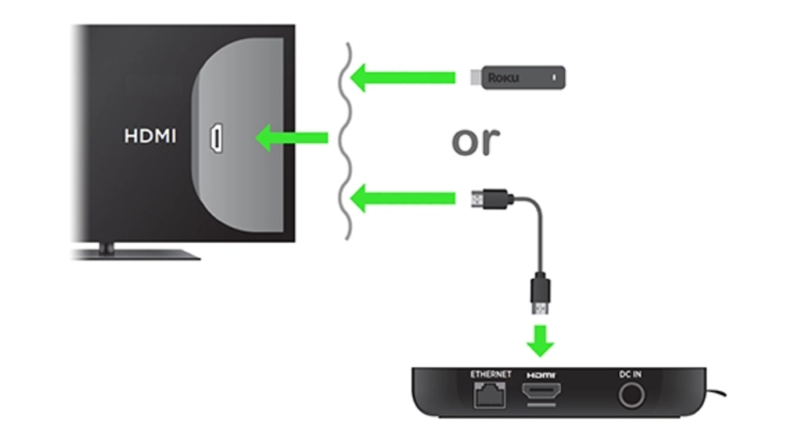 Connect the Roku to an HDMI port on your TV.
Connect the Roku to an HDMI port on your TV. - Connect an Ethernet Cable to the Roku (Optional With Compatible Devices)
If your Roku device is compatible and you want to use a wired network, connect an Ethernet cable to the Roku, and connect the other end to your router.
Note: How Do You Connect Roku to WiFi?: Both the Roku Ultra and Ultra LT have an Ethernet port and you can add an Ethernet cable to the Roku Streambar with a USB adapter. Some Roku TV models also have an Ethernet port. Other Roku devices can only connect via WiFi. We’ll go through the steps for how to connect your Roku to WiFi later.
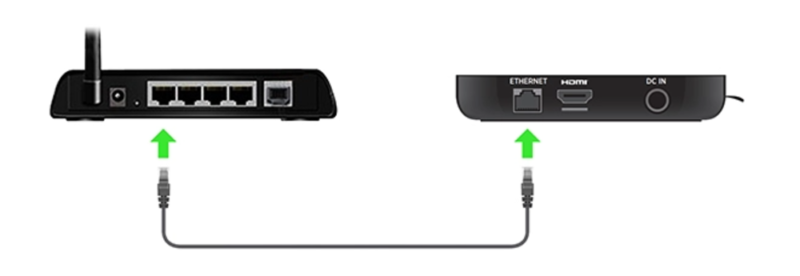 Connect an Ethernet cable (if supported).
Connect an Ethernet cable (if supported). - Connect the Roku to a Power Source
Connect the power cable to your Roku and plug it into an outlet.
Note: How to Power a Roku: The Roku Express, Roku Premiere and Roku Streaming Stick+ can be powered by a USB port on your TV. However, if your TV is not capable of powering the device, you can use the included power adapter to connect it to a wall outlet. For the Streaming Stick+, you must ensure that you use the USB cable with advanced wireless receiver along with the extender cable and power adapter.
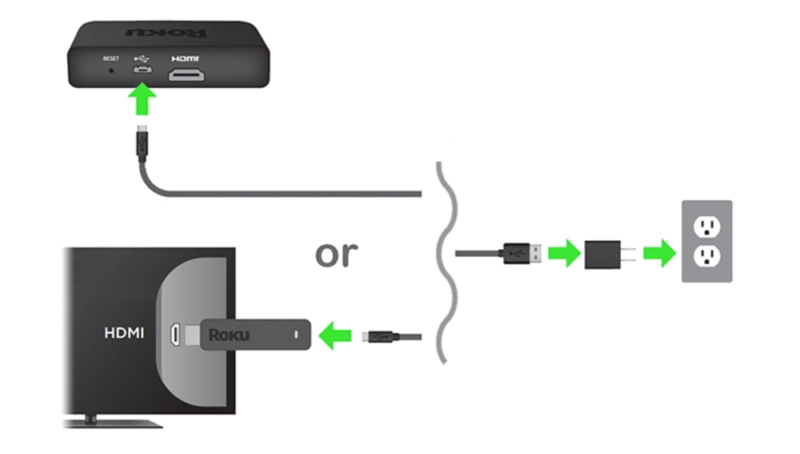 Connect the Roku to a power source.
Connect the Roku to a power source. - Turn on the Roku Device and Choose the Appropriate Input
You can now turn on your Roku and choose the correct input on your TV. As the Roku powers up, you should see a Roku logo on your screen.
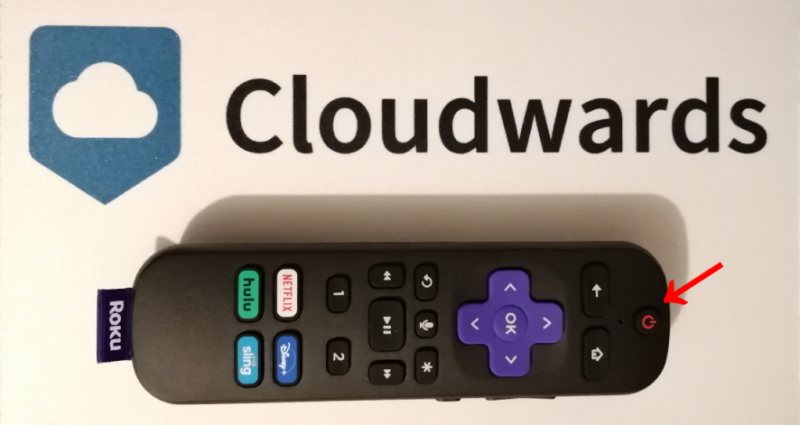 Turn on your Roku to select your TV input.
Turn on your Roku to select your TV input. - Set up Your Roku Remote
Open the battery compartment on the back of your Roku remote and insert the two included AA batteries. The remote will automatically pair with your Roku.
Note: How to Set Up Roku Without a Remote?: Setting up a Roku requires you to use a Roku remote. You can’t set up Roku without a remote. If yours is lost or broken, you will need to purchase a new one.
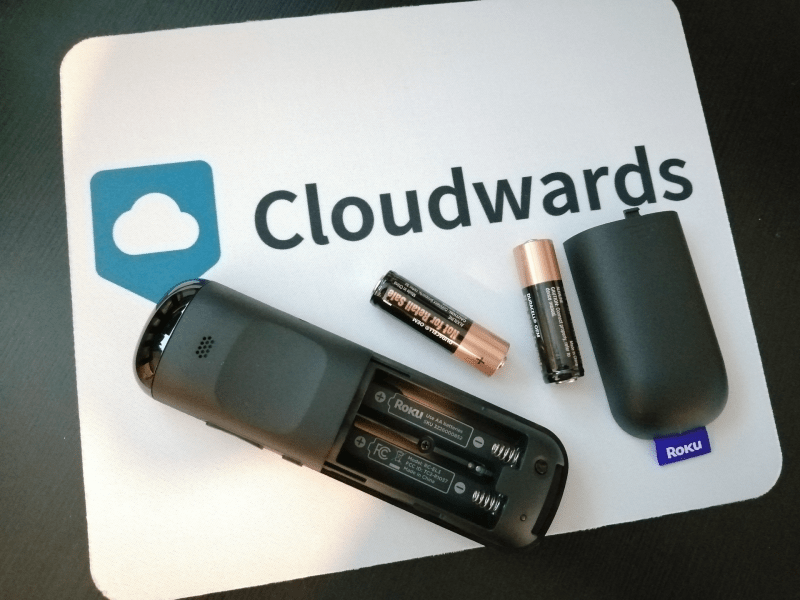 Place the included batteries in the Roku remote.
Place the included batteries in the Roku remote.
How Do I Set Up Roku on My TV?
Now that your Roku is physically connected to your TV and powered on, we’ll move on to setting it up with your TV.
1. Select a Language
First, you need to select the language you want for any text and dialog. Use the up and down arrow buttons on your Roku remote to scroll through the list of languages. Once you’ve chosen a language, press the “OK” button.
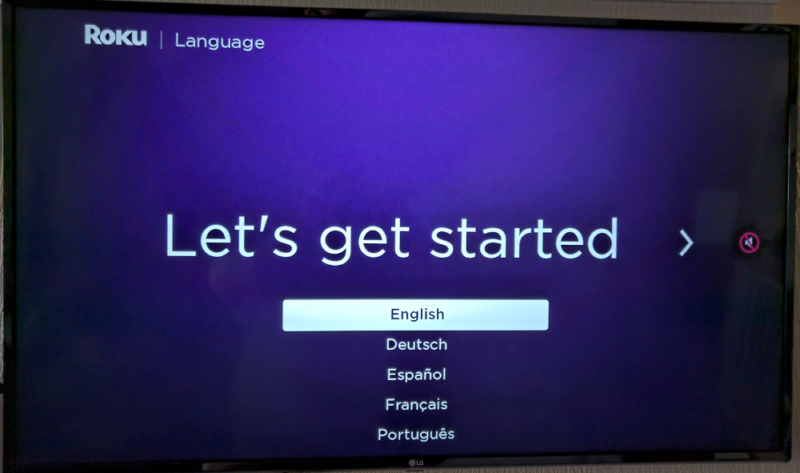
Roku Language Support
Some channels may not support certain languages.
2a. Connect the Roku to the Internet: Ethernet
If you’ve plugged in an Ethernet cable, select “wired” and then “connect to wired network.”
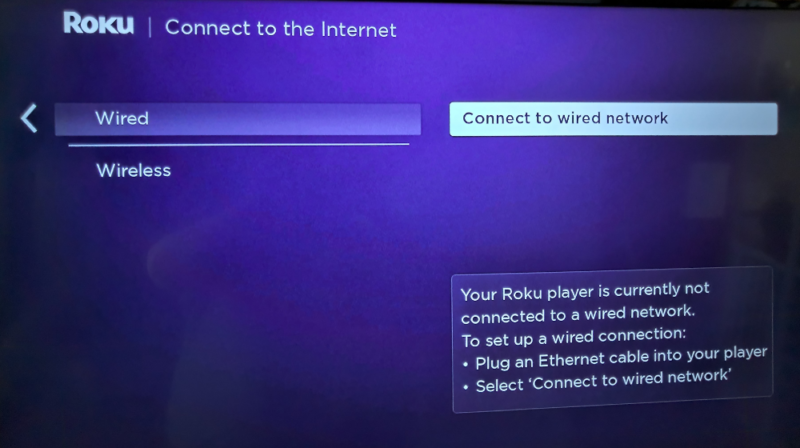
2b. Connect the Roku to the Internet: Wireless
If your Roku device doesn’t have an Ethernet port, you’re not near your router or you’d just prefer to have one less wire connected, you can connect it to the internet via WiFi.
To do that, select “wireless” and then “set up new wireless connection.” Choose your WiFi network from the list and enter your password. If your network is not listed, select “scan” again. Once you’ve done that, select “connect” and the Roku will do the rest.
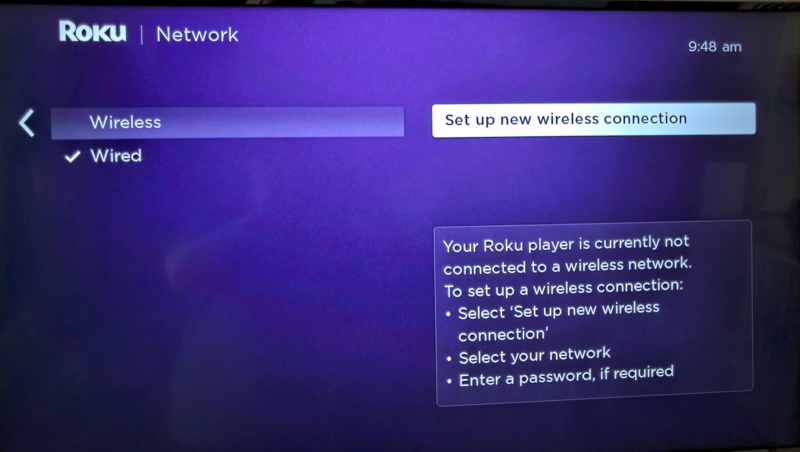
Software Updates
Once you’re connected to the internet, the Roku will check for any software updates. If there is one, download it and restart the Roku.
3. Choose Your Display Settings
The Roku device will automatically figure out the best resolution via your HDMI connection. All you need to do is press “OK” on “auto detect display type.”
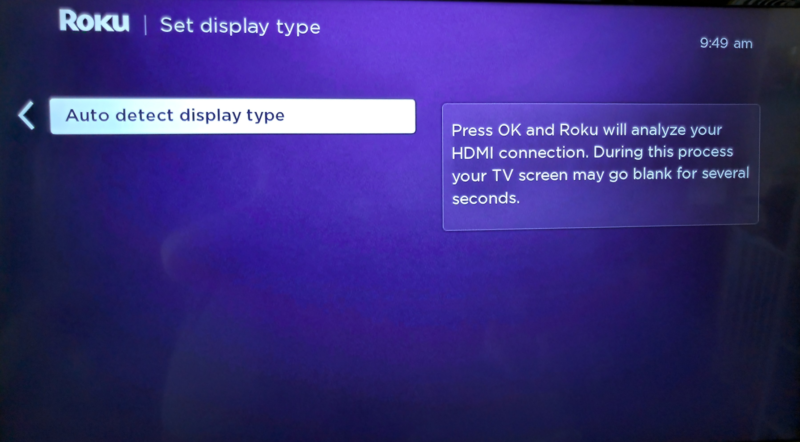
4. Automatic Output
You’ll then see a message about your connection. Select “force output to automatic.” If for any reason you need to change the display settings, simply go to “settings and display.”
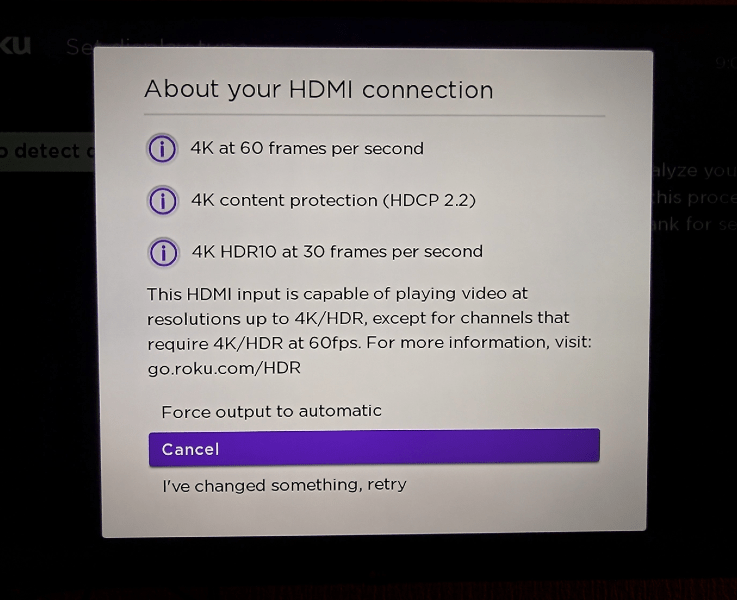
Roku 4K Streaming
For 4K UHD or HDR streaming, you need to ensure you connect your Roku to an HDMI port that supports HDCP 2.2.
How to Set up the Roku Enhanced Remote (Certain Models)
1. Set Up Your TV’s Power and Volume
If your Roku device includes the Roku Enhanced remote control, you can set it up to control your TV’s power and volume. To do that, select “check remote settings.”
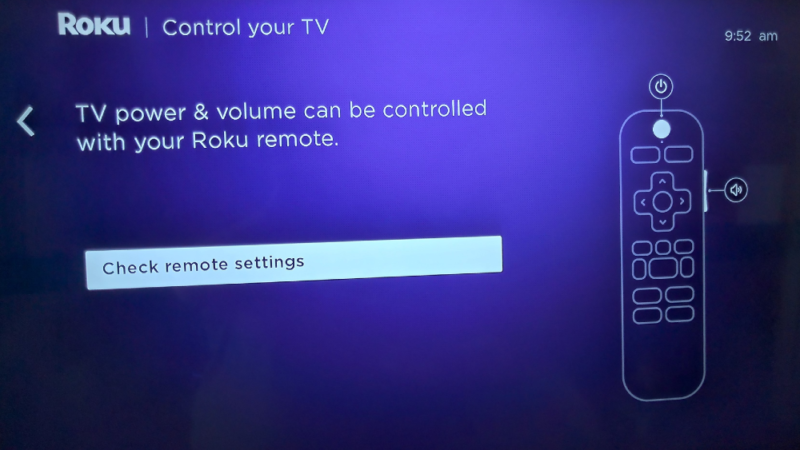
2. Audio Test
It’ll run you through two test stages to ensure the remote will work properly. First, it will play music and ask if you can hear it — select “yes” if you can. Then, it will stop the music and ask you if it has stopped — select “yes” if it has. After that, you’ll see a message saying that the Roku remote control is set up.
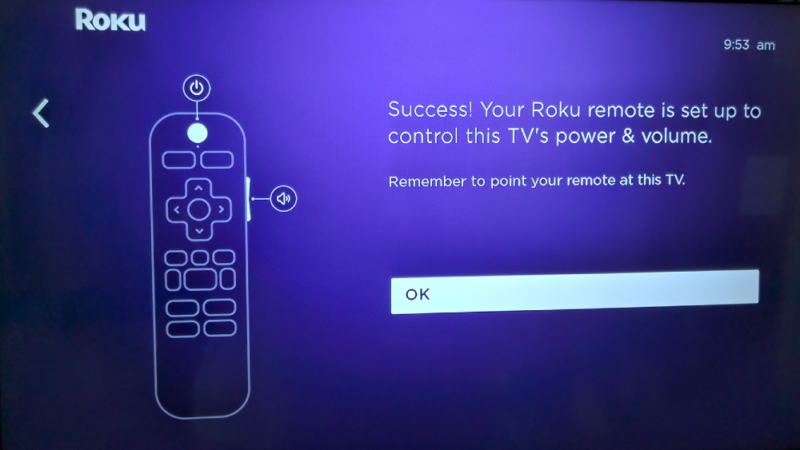
Roku Enhanced Remote
Not all TV models will allow the Roku Enhanced remote to control the volume and power. Also, if you upgrade from the Simple remote to the Enhanced remote, you can set it up by going to “settings,”“remotes & devices,”“remote” and then “set up remote for TV control.”
Create a Free Roku Account & Link the Roku Device
Now you need to set up your Roku account and activate your device. It won’t cost you a cent — you just need to be able to access your email account via your mobile device or computer.
1. Enter Email Address
Enter a valid email address to use with your Roku account. You’ll then be sent an activation email.
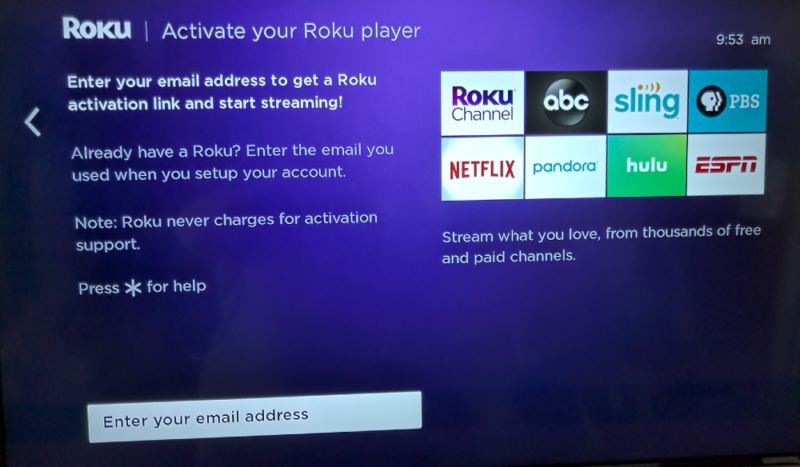
2. Activate Your Account
When you receive it, click on the link provided to activate your account and link your Roku device to it. It’ll take you to a web browser and you just need to go through the steps to create an account with Roku. It will ask you to add a payment method, such as a credit card or PayPal, but adding that does not mean you have to pay for anything. You can also add a purchase authorization PIN in the settings later.
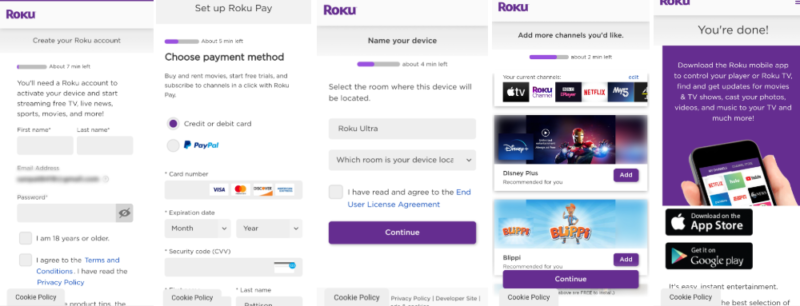
3. Link Roku to Your Account
Once you’ve done that, you need to link your Roku device to your account. You do that by clicking “link a device” and entering the activation code displayed on your TV screen. You can link more devices if you decide to buy a new Roku or a Roku TV.
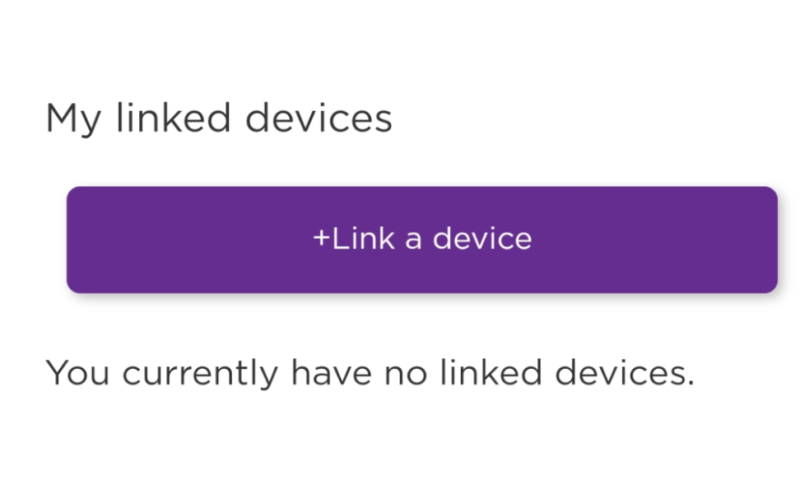
That’s it, you’re all set. Roku will run you through a quick tutorial on how to use it. You can now add paid or free channels to your Roku home screen and start watching your favorite shows and movies. Besides that, Roku lets you add local channels. Some of those Roku channels have cloud DVR features.
If you want to access channels or services that aren’t available in your region, check out our best VPN for Roku guide. Otherwise, you can also check out our how to get local channels on Roku piece.
Final Thoughts
We hope you found our guide useful and now know how to set up a Roku. It isn’t hard, and the Roku will walk you through each step. The actual setup process is almost identical for each Roku streaming device — there are just a few variations, which we have pointed out in our step-by-step guide. Setting up Roku TV won’t be much different, either.
If you have any issues, our Roku troubleshooting guide might help. Once you’re finished setting up your Roku, you can easily add channels and services to watch. We also have a dedicated guide on how to add channels to Roku, as well as a guide on how to manage or cancel a Roku subscription.
Furthermore, you can also check out our guide on how to cast to your Roku from iOS, Android and Windows 10.
Now you can sit back and enjoy your favorite movies and shows, popcorn in one hand and Roku remote in the other.
What do you think about the Roku setup process? Do you think it’s easy? Did you have any trouble during setup? Let us know in the comment section and, as always, thank you for reading.
FAQ
-
For the most part, yes. The basic Roku setup is the same, but there are a few steps that vary slightly for different Roku devices. For instance, some Rokus support a wired internet connection, some can be powered via a USB port and so on.
-
Yes, it’s easy to set up Roku. The basic setup includes connecting the Roku device to your TV, a power source and the internet, then you go through the on-screen settings, create a free Roku account, activate it and you’re all set. Now you can start adding free or paid channels.
-
It doesn’t cost money to set up Roku. You have the initial device cost, but after that, you can essentially use the Roku for free. There are plenty of free channels with free content available. You can add paid channels and subscriptions to your Roku, but you don’t have to. Read our Roku scams piece to make sure you stay clear of any fraudulent activity.
-
As a general rule, a Roku remote is necessary for setting up your Roku device. However, there is a workaround: you can use your smartphone or tablet as a substitute remote.
All you have to do is download the official Roku app for your smartphone. Make sure that your smartphone and your Roku device are connected to the same WiFi, because this is how the app connects your phone to your Roku.
Follow the in-app instructions and select “Devices”. The app will then find all of your Roku devices. Once it’s done searching, select your device and wait for it to pair.
Once paired, select “Remote”. And voila – you can use your smartphone to set up your Roku!
-
Your Roku TV comes with an ATSC tuner that allows you to access digital television. This means that you can watch “over-the-air” television, also known as broadcast television. All you need is an HDTV antenna.
The first step is making sure that your HDTV antenna is connected to the Live TV input on your TV. You need to connect your HDTV antenna cable to the back of your TV. The connector is called “Ant/Cable In”.
Once this is done, you should use your Roku remote to press the “Home” button and select “Live TV”. Further instructions will show up on your TV screen — follow them to complete the setup.
The post How to Set Up Roku in 2024: Easy Steps to Get Connected appeared first on Cloudwards.

